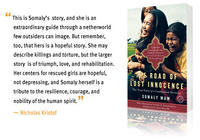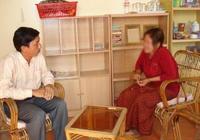The Body Shop Speaks Out for Trafficked Children

The Body Shop stands as a model for how corporations can make a difference. The Somaly Mam Foundation has partnered with The Body Shop and their Stop Sex Trafficking of Children and Young People Campaign to raise funds and awareness to combat the epidemic of sex trafficking. We had the opportunity to catch up with Shelly Simmons to talk about the campaign and The Body Shop’s role as a good corporate citizen. Shelley is the Brand Communications Director for The Body Shop in the US, Canada, and Mexico. She oversees the Stop Sex Trafficking Campaign, and worked with MTV to create The Body Shop and MTV’s HIV and AIDS awareness campaign. In addition, Shelley oversees The Body Shop Foundation in the Americas, which donates funds to grassroots organizations working on issues of environmental protection, animal welfare, self-esteem and human rights.
Somaly Mam Report – The Body Shop has shown an extraordinary commitment to being socially responsible. When did that start and what impact has it had both inside and outside your company?
Simmons – The Body Shop was founded on the belief that business could and should be a force for positive social change. It has never been an “add on” for The Body Shop or something we do because it’s fashionable. Our founder, Dame Anita Roddick, was a social activist and a businesswoman – a pretty incredible combination. So, when she opened the first store of The Body Shop in 1976 in the UK she did so with the intention of helping to change the world for the better. To this day her philosophy remains at the very foundation of our business.
SMR – In creating the STOP campaign The Body Shop is leading the way for corporations to take on tough issues like trafficking. Was it a difficult decision to make?
Simmons – Deciding to launch Stop Sex Trafficking of Children & Young People wasn’t a difficult decision to make because we have a heritage of taking on challenging issues and bringing attention to them. We like a challenge! Before Anita passed away she had been very involved in understanding more about the issue of human trafficking and exploring how she could help bring it to public attention. She passionately believed that The Body Shop was the perfect platform to raise awareness on human trafficking. We decided that the best way we could honor her memory was to launch this campaign and really help to drive a difference on the issue. So, here we are today, campaigning in shopping malls and street locations in 65 countries across the world.
SMR – Whey you consider the hurdles that other companies might face in convincing key decision makers to build campaigns around issues like trafficking, what advice would you give them?
Simmons – I think we’d advise any company looking to support challenging issues like trafficking to simply be brave and to explore how they can best bring value to the table. It isn’t always about fundraising and it certainly isn’t about becoming an expert on a complex issue. People generally are very compassionate and want to help, they want to make a difference. By becoming a vehicle or a platform to enable people to do their bit, you can make a powerful difference in the world. We are all global citizens and businesses in particular have incredible resource to lend to those tackling some of the world’s most challenging issues. For us, we are a communications channel, but for another business it could be providing IT support, or HR expertise or legal counsel. Just like every individual, every business has something valuable to offer.
SMR – How has the campaign engaged your employees at your corporate offices and stores?
Simmons – Our people in our Home Offices and in the stores are passionate beyond belief about helping to stop sex trafficking of children. They have taken time to learn about the issue, to understand some of the complexities and to be able to share their understanding and passion with our customers, who in turn have also become so engaged with helping to support the campaign. Many of our people have signed up to become supporters of our campaign partners and want to know what more they can do to help. Some are fundraising in their own time. And we want to support them in doing so. Their energy and enthusiasm is infectious and inspiring.
SMR – Many cause-related marketing efforts often don’t have much depth beyond the principal messaging. With the STOP campaign you have brought together key partners in the anti-trafficking movement, sponsored a significant report on the trafficking of children, and developed campaign-branded products like Soft Hands Kind Heart Hand Cream. Please tell us more about the vision behind the campaign and how you see the various components contributing to the effort?
Simmons – Quite simply we want to help drive significant change on the issue of sex trafficking of children, everywhere it exists, which is everywhere in the world. We want an end to the trafficking of children for sex and we want support for the survivors, because they have a right to a safe and happy life, just like we all do. For us, it is not cause-related marketing, it is campaigning. We have committed to this issue because at the end of our campaign we want to be able to say to our customers – this is what we achieved together. Not what The Body Shop achieved but what we all achieved – our campaign partners, our customers, and supporters of the issue. This year we were invited to take part in the Clinton Global Initiative here in New York to share our experience of launching the campaign and our message really was a call to action to all corporations. With creativity and imagination we can all do something to help. Our campaign efforts were described as an “exemplary approach” to tackling this issue and we were proud to receive such acknowledgement.
SMR – How have customers responded to the STOP campaign?
Simmons – The response from our customers has exceeded all our expectations. I think many people are shocked, many had no idea that trafficking of children could possibly still exist in the 21st century but overwhelmingly our customers are compassionate human beings who just want to do something to help. We tell our customers that you can be a part of the campaign in any way that you are comfortable. If you want to just buy the fundraising product and raise money for our partners that is wonderful. If you want to get involved, then here’s our campaign partners contact details and here’s what you can do. Throughout the campaign we will be continuing to develop ways to engage the support of our customers and I look forward to sharing more news on that later in 2010. Watch this space.
SMR – Many people want to do more to support efforts to eradicate human trafficking. What message would you like to share with our readers about steps that they can take?
Simmons – I think sometimes issues can feel overwhelming and you don’t really know how you, as an individual, can make a difference. The reality is that with every positive action we take, whether it is giving a donation, volunteering, writing a letter or supporting a campaigning organization, we are helping to effect change. The best piece of advice I ever heard on campaigning was from Anita. She liked to say “if you think you are too small to make a difference, try going to bed with a mosquito in the room.” Every time I feel myself falter I remember those words, because they ring so true.

















Comments
“The Body Shop was founded on the belief that business could and should be a force for positive social change. It has never been an “add on” for The Body Shop or something we do because it’s fashionable”- Ms. Simmons.
I’m so glad Ms. Simmons mentioned that, many consumers feel that companies jump on the train just so they can get “ahead”, which is true.But because the answer Ms. Simmons gave was so on point and accurate I applaud the Body Shop for that.
Regardless if companies do it “to get ahead” or from the heart it still brings awareness and I think Sex Trafficing is a huge issue that does not get enough attention. I also am a strong believer in that big companies who do have substantial markshare and consumers are aware (through social media, adverts etc.) of them that they are able to make a difference and POSITIVE SOCIAL CHANGE should be a core compentency.
I just want to say Thankyou the BodyShop just made another loyal customer. :)
Post new comment